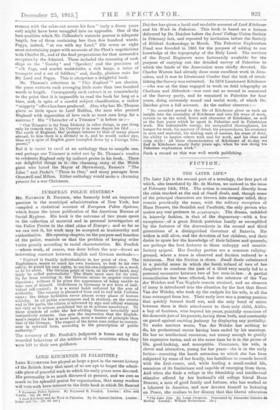EUROPEAN POLICE SYSTEMS.*
Mn. Pevmosna B. FOSDICK, who formerly held an important position in the municipal administration of Now 'York, has compiled a statistical account of European Police Systems, which forms the latest publication of the American Bureau of Social Hygiene. His book is the outcome of two years spent in the collection of material and in personal investigation of the Police Forces in the chief cities of Europe ; and so far as we can test it, his work may be accepted as trustworthy and authoritative. His opening chapter, on the purpose and function of the police, reminds us that the problem of keeping order varies greatly according to racial characteristics. Mr. Fosdick —whose work, of course, was done before the war—draws an interesting contrast between English and German methods :- " England is frankly individualistic in her point of view. The Englishman wants to mind his own business, to look to his own safety, to guard his own rights, to use his own judgment—in a word, to be lot alone, The German point of view, on the other hand, may fairly be called paternalistic. The State must care for its own. So far from resenting it, the German seems to require constant direction ; without it he gives the appearance of being unable to take care of himself. Orderliness in Germany is not born of indi- vidual self.control ; it is a social habit enforced by the arm of authority. The country is placarded from end to end with Verboten signs ; the things forbidden cover almost every phase of human activity. In all public conveyances and in stations, on the streets and in the parks, the citizen is informed by sign and °Gioia warning not only as to actions prohibited but as to actions mandatory. To those symbols of order the law-abiding German invariably and instinctively submits. One gets the impression that the English- man's respect for law is more baaio, more a matter of principle than that of the German. The respect of the latter runs rather to correct- ness in outward form, according to the prescription of public
authority."
The accuracy of Mr. Fosdick's judgment is borne out by the
recorded behaviour of the soldiers of both countries when they were left to their own guidance.


































 Previous page
Previous page